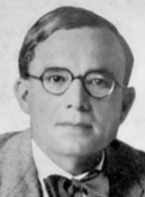J. D. Unwin
| Joseph Daniel Unwin | ||
|---|---|---|
 | ||
| Información personal | ||
| Nacimiento | 1895 | |
| Fallecimiento | 1936 | |
| Nacionalidad | Británica | |
| Información profesional | ||
| Ocupación | Antropólogo y profesor universitario | |
| Empleador | ||
| Distinciones | ||
Joseph Daniel Unwin (1895–1936) fue un etnólogo y antropólogo social inglés que trabajó en la Universidad de Oxford y en la Universidad de Cambridge.
Contribuciones a la antropología[editar]
En Sex and Culture ("Sexo y cultura", 1934), Unwin estudió 80 tribus primitivas y 6 civilizaciones conocidas a través de 5.000 años de historia y sostuvo que había una correlación positiva entre el avance y progreso cultural con la abstinencia sexual.[1] Aldous Huxley describió Sex and Culture como "una obra sumamente importante".[2]
Según Unwin, después de que una nación prospera, se vuelve cada vez más liberal respecto a la moral sexual, por lo que la sociedad pierde su cohesión, su ímpetu y su propósito. El efecto, dice el autor, esto es irrevocable.[3] Unwin también defendió que la igualdad legal entre mujeres y hombres era un prerrequisito necesario para lograr la monogamia absoluta.[4]
Obras[editar]
- Sexual Regulations and Human Behaviour. Londres: Williams & Norgate ltd., 1933.
- Sex and Culture. Londres: Oxford University Press, 1934.
- The Scandal of Imprisonment for Debt. Londres: Simpkin Marshall Limited, 1935.
- Sexual Regulations and Cultural Behaviour. Londres: Oxford University Press, 1935.
- Sex Compatibility in Marriage. Nueva York: Rensselaer, 1939.
- Hopousia: Or, The Sexual and Economic Foundations of a New Society, con introducción de Aldous Huxley. Nueva York: Oskar Piest, 1940.
- Our Economic Problems and Their Solution (An extract from "Hopousia.") Londres: George Allen & Unwin, Ltd., 1944.
Artículos seleccionados[editar]
- "Monogamy as a Condition of Social Energy,” The Hibbert Journal, Vol. XXV, 1927
- "The Classificatory System of Relationship," Man, Vol. XXIX, Sep., 1929.
- "Kinship," Man, Vol. XXX, Apr., 1930.
- "Reply to Dr. Morant's 'Cultural Anthropology and Statistics'," Man, Vol. XXXV, Mar., 1935.
Otros[editar]
- Dark Rapture: The Sex-life of the African Negro, con una Introducción de J. D. Unwin. Nueva York: Walden Publicación, 1939.
Véase también[editar]
Referencias[editar]
- ↑ "Any human society is free to choose either to display great energy or to enjoy sexual freedom; the evidence is that it cannot do both for more than one generation." Unwin, J. D. (1934) Sex and Culture. London: Oxford University Press, p. 412.
- ↑ Huxley, Aldous (1946). "Ethics." In: Ends and Means. London: Chatto & Windus, pp. 311–12.
- ↑ Unwin, J. D. (1927). "Monogamy as a Condition of Social Energy,” The Hibbert Journal, Vol. XXV, p. 662.
- ↑ Unwin, J. D. Sex and culture, pp. 431-432.
Bibliografía[editar]
- Firth, Raymond (1936). "Sexo y Cultura", África, Vol. 9, Núm. 1, pp. 126–129.
- Morant, G. M. (1935). "Cultural Anthropology and Statistics; A One-Sided Review of 'Sex and Culture", El Hombre, Vol. 35, pp. 34@–39.
- Yancy, Philip (12 de diciembre de 1994). «The Lost Sex Study» (en inglés). Consultado el 23 de septiembre de 2017.
